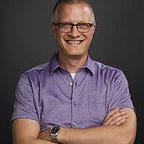Why Organizational Spirituality’s Not about Self-Care Merely
I don’t remember how old I was when somebody told me a story about a rabbi who was telling stories to a huge crowd. His stories tumbled out, one after the other, and the crowd listened, absorbed, all afternoon and into the evening. The next day, the rabbi told more stories. “Here is what the Kingdom of God is like,” he kept saying, and then he’d tell another story, like someone convinced that no one story could ever quite do it.
This went on for several days, until everybody’s food ran out. The rabbi’s students came to him and said, ‘Master, these people — we gotta let them go. They should hit the next town for some bread and coffee.” And the rabbi looked at them quizzically and said, “You feed them.”
That’s not where the story ends. But I’m thinking about that moment in the story, because I’ve been writing and researching about social entrepreneurship and spirituality. Really, my book is for organizational leaders of all kinds, not just those who find themselves in social enterprises. Why Spiritual Capital Matters, I’m calling it. There’s an accompanying podcast, of course — an effort to think out-loud about what’s going on when it comes to the optimistic spirituality of social entrepreneurs.
No kidding, these people seem to have heard a voice saying to them, “You feed them.” And their organizations seek to respond to that call. Whether in a town in the central plains of Haiti or a southside neighborhood of Chicago. “You feed them.”
I’m thinking about this need for provision in our society, in the United States, and in other wealthy countries, where resource allocation, especially across racial lines, is too often a project in self-protection or tribal protection. Too many people, too few resources, so secure your own stuff. Grab some bread, grab what you need — and tell everybody who’s not in your tribe to go to the next town to get what they need.
It’s not working too well, this self-protectiveness, this self-interestedness, this scarcity-mindedness. It’s not working well in our institutions which are stagnating because of polarization. It’s not working well in our organizations, which are fighting for smaller and smaller pieces of the available bread and fish.
So, as I’ve talked to, what is it now, 45 people in and around the field of social entrepreneurship, my research has turned up an interesting fact that I don’t think enough of the gurus are talking about. Here’s what I’m thinking: social entrepreneurs are very practical. They seek daily bread. But they are also deeply, optimistically spiritual people.
It’s been tempting at many points to reduce this mode of living and working to biology or sociology: to say that, really, the spiritual is just another instance of chemicals in motion or that spirituality is just what humans gotta have to make society work. We meditate or pray because it makes good things happen in our pre-frontal lobes or in our organizations.
But I think that the strange, horrible persistence of racial injustice — black lives that keep getting ended. Black and brown communities that keep getting told to go to the next town, because we don’t have enough for them. I think that all this requires biology and sociology. But it is everywhere and always a spiritual predicament.
So, here’s my fear. That when you hear that social entrepreneurs are spiritual, you hear “They’re into self-care.” Self-care is important, but the spirituality I’m talking about, and that I think my interviewees are talking about, is larger than that. It is a way of facing where we came from and where we’re going. For people of faith, that where we came from and that where we are going is the divine. But even if that’s not plausible to you, I hope you can agree that humans have a capacity — who knows where it came from or how it evolved — to see some kind of sufficiency in the midst of some kind of scarcity. I think that optimistic looking for sufficiency is organizational wisdom, the ground of collective innovation. I also think it’s societal wisdom, the hope of equity for all, so that social entrepreneurs and other organizational leaders find themselves not just dickering over resources, but sharing them and then, to their surprise, looking for containers for all the leftovers.
